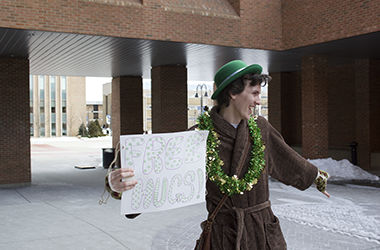‘KSU Leprechaun’ brings joy, inspires change in spirit of St. Patrick’s Day

Since about mid-January, Christopher Mosquera has been strolling around campus every day wearing the same brown fuzzy bathrobe, leprechaun hat and St. Patrick’s Day tinsel around his neck.
March 10, 2015
For some, the daily decision of what clothing to put on their backs isn’t given much thought. Others strategically plan each and every outfit. For Christopher Mosquera, the decision has been relatively easy.
Since about mid-January, the junior psychology major has been strolling around campus every day wearing the same brown fuzzy bathrobe, leprechaun hat and St. Patrick’s Day tinsel around his neck.
His goal is to “bring happiness, joy and celebration into the public space.”
“When you look around at what we would call the ‘real world,’” Mosquera said, “what you see is incredibly serious and oppressed.”
On any given day, Mosquera can be spotted at different locations on campus such as the Kent State Student Center, at campus events or even just walking around the Esplanade. He’s followed by background music coming from a speaker in his pocket and occasionally holds a sign reading “Free Hugs.”
He just wants to make someone smile or talk to him.
“Here in college, everywhere you walk people are staring down at the floor or at their phones,” Mosquera said. “They have headphones on; everyone is disconnected; and people don’t even acknowledge each other’s presence.”
“People don’t know how to love each other anymore or how to bond,” Mosquera said. “They never teach you in school things like how to build a friendship, even though friendship is one of the most important things in life because if you don’t know friendship, what the hell is life?”
From a young age, Mosquera said that he saw the world as being very oppressed but never knew how to go about changing it. It wasn’t until years later that he said he reached a point where he became motivated to become the person he is today.
“I woke up one day and said to myself, ‘I’m going to be the most happy, joyous celebratory human being that this world has ever seen,’” Mosquera said. “That’s really what I’m trying to bring out into the world is that love, appreciation for life and that celebration because life is a beautiful thing.”
Growing up, Mosquera said that his mother was a huge influence on his character. He credits her with inspiring him to bring beauty and happiness back into the serious and depressed world.
Mosquera said the way he dresses is all part of his message to not only spread joy but to encourage people to “dress how they want to dress, feel how they want to feel and be happy.”
He said that what he’s doing is mostly well received by his friends who have been supportive and that most encourage him to do whatever makes him happy.
“I thought it was pretty funny what he was doing, and unique to not care what everyone thinks,” said Aaron Goldweber, a freshman photo illustration major and friend of Mosquera.
Although some people don’t understand what he’s doing and call him a “nut,” Mosquera said it’s all worth it to see a smile on someone’s face.
“Even if I get 100 frowns for one smile, it’s worth it,” Mosquera said, “My favorite part of the day is when I can give someone a hug, and they’re like ‘Thank you,’ and I’m like ‘No, thank you. Be happy, and happy St. Patrick’s Day!’”
Last year, Mosquera said he tried a similar tactic, but instead of dressing festive for a holiday, he dressed up as a dog.
“I wore a Dalmatian outfit everywhere I went, but that didn’t work out too well because it had a head cover over my face,” Mosquera said. “But I’m sure I’ll find something else festive and cheery to wear once spring rolls around.”
Mosquera said that even though he might not be influencing mass amounts of people with what he’s doing on campus, it’s a start for what he hopes is change.
“This is small in comparison to the big things I’m trying to change,” Mosquera said. “This is a fraction, a small statement for a large problem.”
Contact Jenna Kuczkowski at [email protected].
























